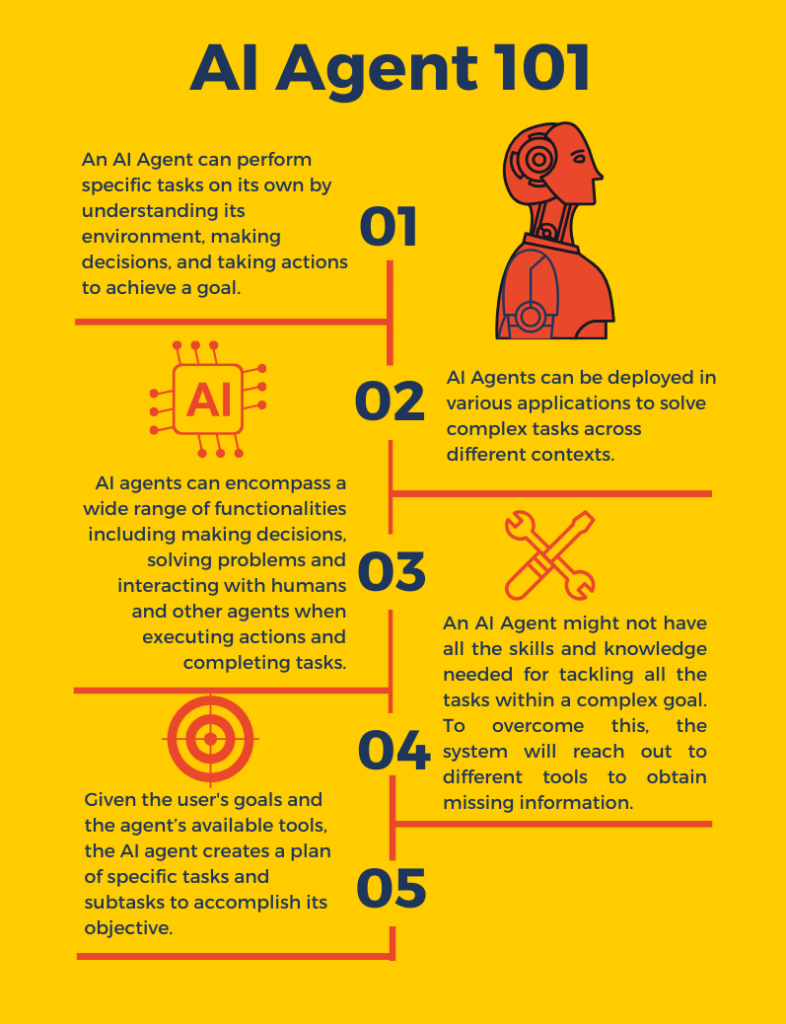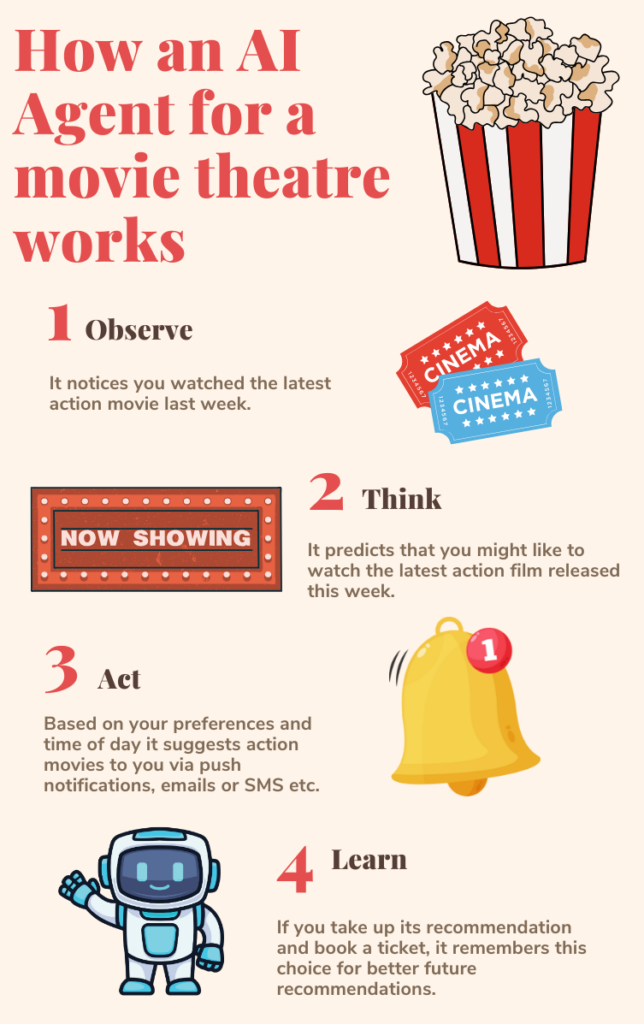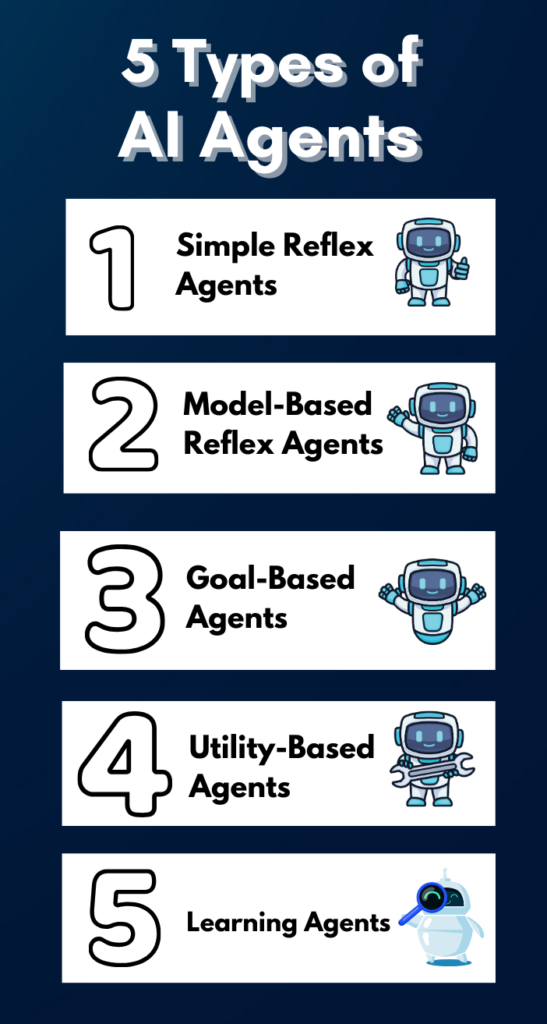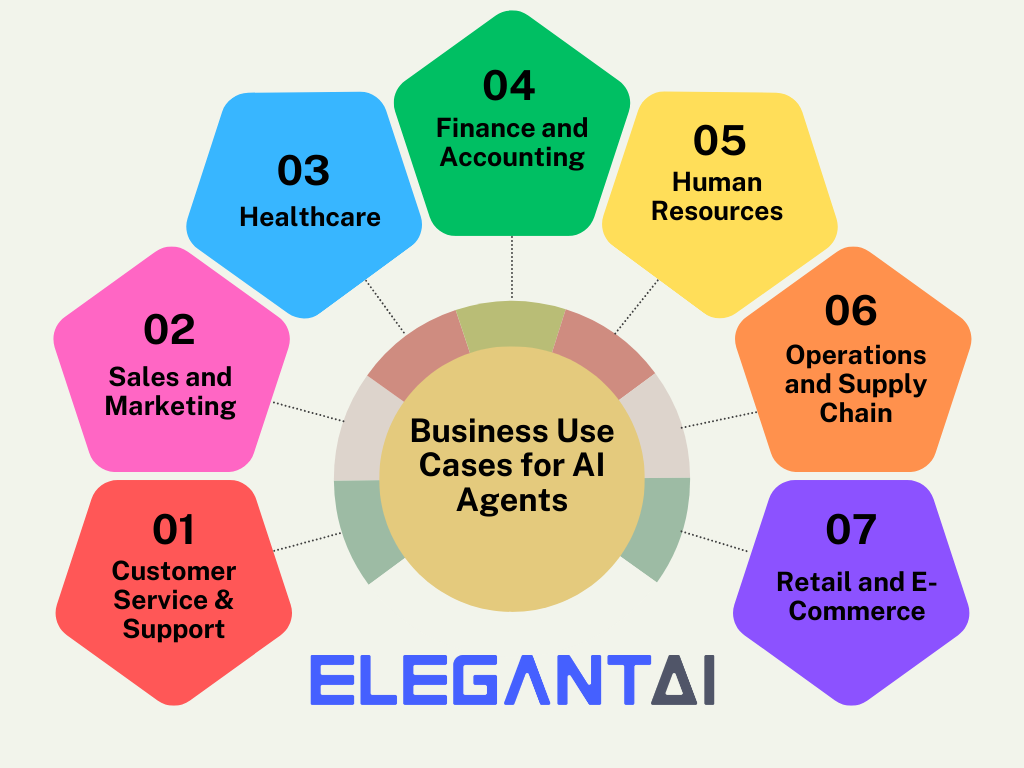The next step in the AI revolution are AI Agents! Think of them as smart helpers that work independently to make things easier!
In this blog post we will break down everything you need to know about what AI Agents are, what they do and how you can use them to get things done – smarter, faster and efficiently.
- What is an AI agent?
- Common Examples of AI Agents
- Agentic versus Non-Agentic
- How do AI Agents work?
- Types of AI Agents
- Business Use Cases for AI Agents
- Benefits of AI Agents
- Do AI Agents need humans?
- Conclusion
What is an AI agent?
In the most simplest terms, an AI Agent can be described as a computer program or system designed to perform specific tasks.
It does this by analysing information, learning from its past experiences and adapting to new situations in order to complete tasks or solve problems efficiently.
Common Examples of AI Agents
- Autonomous AI Agents that recommend products to customers based on their preferences
- A chatbot that answers customer questions autonomous ai agents –
- A Virtual Agent or AI Voice Agent that follows voice commands like Siri or Alexa

Breaking it Down – Agentic versus Non-Agentic
Agentic AI Agents in AI systems can act independently to complete their tasks and achieve specific goals. They are empowered to observe their surroundings, figure out the best course of action, and take the necessary steps without needing constant human direction.
They learn to adapt to various user expectations over time, thereby providing a more personalised user experience and accurate and comprehensive responses.
Non-agentic AI refers to AI systems that don’t make decisions independently. Instead, they function as tools or programs that perform specific tasks when directed by a human or another Agentic AI Agent. They can only achieve short-term goals and cannot plan ahead.
How do AI Agents work?
There are four main steps that every Conversational AI Agent follows in completing tasks:
Firstly the agent takes in user inputs (such as a request made to a chatbot) to understand its environment.
Secondly the agent then analyses the input data using algorithms and predetermined rules. This is similar to problem solving – figuring out what needs to be done based on the information they have.
Thirdly the agent will then take the most appropriate action based on their analysis. This might include answering a question or suggesting a product for example.
Finally the agent, having completed the task, will learn from their past actions to improve their future performance.

77% of businesses report that they use AI in some form, often leveraging AI agents for customer service, sales, and operational tasks.
Types of AI Agents
AI Agents can be classified according to their varying levels of capabilities from performing simple straightforward tasks to complicated requests.

1. Simple Reflex Agents
The most basic of AI Agents that are preprogrammed to perform actions that correspond only to certain input conditions. They do not have the ability to interact with other agents or learn from past experiences. Simple reflex agents cannot respond to situations it is not prepared for.
2. Model-Based Reflex Agents
AI agents that make decisions by using a learned model of the world to help it understand and act. As and when new information is received the agent updates the model. Unlike simple reflex agents, model-based reflex agents can store information and its actions are dependent on its understanding of the model, previous encounters and the current task in hand, alongside a set of rules.
3. Goal-Based Agents
These agents are guided by a set of goals and continually seek inputs that allow them to plan their actions, in order to reach their particular goals. Think of them as AI Sales Agents.
4. Utility-Based Agents in AI
Utility-based intelligent agents in AI respond to user inputs based on a set of fixed criteria. They compare and contrast multiple scenarios and then think and decide the most efficient and optimal manner of using predetermined utility functions to achieve a desired goal. Think of them as AI Travel Agents.
5. Learning Agents
These agents are constantly learning about their environment and from their past experiences. This learning happens automatically, making it better served to respond to unfamiliar environments.
Business Use Cases for AI Agents

Customer Service & Support
AI Agents can provide 24/7 multilingual customer support, help your customers navigate products or services and make recommendations. Business owners can monitor and analyse feedback from AI Agents to improve customer experiences.
Sales & Marketing
Using AI Agents Sales and Marketing teams can automate lead qualification and create personalised promotional campaigns based on behavior and preferences.
Retail & E-Commerce
From personalised product recommendations, to real time pricing adjustments, AI Agents help to engage and retain customers in a profitable manner.
Operations & Supply Chain
A Software Agent in AI can predict demand and optimise logistics in order to manage inventory profitably.
Human Resources
HR professionals can automate the recruitment process using an AI Agent in addition to onboarding, training and evaluating the performance of employees with AI Agent feedbacks.
Finance & Accounting
AI Machine Learning Agents can play an important role in the detection of fraud and also track and manage expenses by generating financial reports and forecasts.
Healthcare
Virtual Assistants for health that are powered by AI Agents, can assist with basic health screening, analysing test result data and end-to-end patient management.
Benefits of AI Agents
Task Automation
With the use of AI Agents it is possible to reach your business goals quickly, affordably, efficiently and accurately without the need of human direction. An AI Agent Service can perform repetitive tasks productively allowing their human counterparts to focus on actions that are more important.
Higher Quality of Responses
Because AI Agents are constantly exchanging information with other agents and utilising other agents and tools to complete their tasks, they are able to provide increasingly personalised responses that are accurate and comprehensive. The higher the quality of the responses the better the service experience is for the customer. An AI Agent will update its behaviour in order to learn from previous encounters.
80% of users rate their experience with AI agents positively due to faster responses and better accuracy.
Do AI Agents need humans?
Especially during the early phases of the learning process in a new environment infrequent human feedback is required in order for the AI Agent to understand its performance capabilities and standards. Human feedback allows the AI Agent to adjust its responses and adaptability according to varied user preferences.
Conclusion
AI Agents streamline tasks, operate independently, and predict our needs. By observing, thinking, acting, and learning, AI Agents significantly boost productivity while reducing human involvement and minimising errors.
Over time, AI Agents will continue to bring significant benefits to various aspects of our lives be it enhancing business productivity or making it simple and easy to manage everyday tasks. By fully embracing AI Agents, you can pave the way for a smarter, efficient and more profitable future.
Elegant AI
As Australia’s leading AI Consultancy company, Elegant AI, is dedicated to creating cutting-edge solutions that empower businesses and individuals with new possibilities for Human-AI collaboration. With a team of seasoned AI experts, we specialise in developing custom AI applications, AI Agents, AI Chatbots and AI powered tools that drive innovation and accelerate digital transformation.
![AI Agents - Everything you Need to Know [2025]](https://elegantai.io/wp-content/uploads/2025/01/EM-Blog-Stargate-2.png)

Leave a Reply